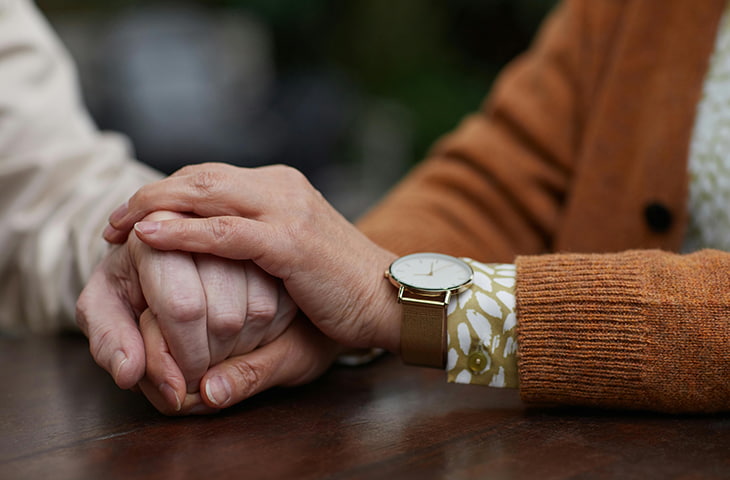7 Ways To Prevent Someone With Dementia From Getting Lost Or Hurt

Be sure your loved ones have some form of identification on them.
Multiple forms of identification with emergency contact numbers and disclosure of their dementia diagnosis (and any other health conditions) are a good idea, in case one form is removed or lost. You might get an ID bracelet or pendant, or one that laces into shoelaces or attaches to a watchband, as well as identification inside their clothing and in their wallet and on their phone.
My boyfriend suggested a very simple Road ID bracelet with a comfortable wristband like the one he wore when he went running. I purchased one for my dad, and he wore it day and night for eight years, never trying to remove it.
Be sure you have recent photos in case they are needed in a search effort.
4. Use GPS tracking
If your loved ones have a smartphone, ensure there is a GPS installed that you can access if you can’t find them, or if you need to track their progress when they travel alone. For example, use the Find My app (iPhone, Apple watch, laptop, iPad, or an air tag that you’ve attached to keys or other items) feature on Apple devices, or Find My Device and Find My Friends on Android devices. Other smartphone apps like Life360 Family Locator and Glympse for Auto help you track loved ones in real time. Another option is a device attached to the car dashboard, such as MotoSafety.
You can attach trackers that don’t require a smartphone to clothing, keys, wallets, cars (in the trunk or underneath the bumper) or just about anywhere, including shoe-sole inserts. Consider a medical alert device (or personal emergency response system — PERS), that has GPS capability so people can access help or be tracked wherever they go.
5. Pay attention to exits and safety hazards in the yard and garage.
People who have dementia and visual/perceptual impairments may walk into glass doors, so place stickers on them. Fence in and add locked gates to the yard and, separately, the swimming pool. Monitor safety of pathways and steps, including for rain, snow and ice; and ensure adequate lighting. If the grill is a concern, lock the cover and access to gas tanks and all fire starters. Check the garage for safety hazards like gasoline, tools or ladders, and block access if they pose a danger. If your loved one can easily access a neighbor’s yard, talk with the neighbor about safety issues.
6. Assess whether driving is safe.
Many people drive for a while after a dementia diagnosis. If your loved ones are still driving, be sure to constantly monitor their judgment; vision and visual processing; safety; and driving/navigating skills. They may be able to operate the car safely, but unable to find their way around. Confer with his or her doctor and review AARP’s We Need to Talk online seminar about discussing hanging up the keys with a loved one.
Be mindful that your loved ones know that when they stop driving, their independence is threatened. They may fear isolation, so be sure to have alternative transportation options available. Some caregivers must hide the car keys or remove the car from the home to prevent their loved ones from driving. Even if you don’t think there’s a chance they could get in the car and drive, it’s a good idea to put a GPS tracker in it.
7. Flag access to bicycles, lawn mowers, tractors, golf carts.
Keep in mind your loved ones might decide it’s a good idea to ride one of these vehicles (especially if they are no longer driving cars). Be sure to monitor their ability to use them safely, and to block access if they can’t. One can get quite a distance in one of these alternative vehicles.
Remember that abilities and needs can vary greatly among individuals with dementia, and safety concerns can change as the disease progresses. Continually assess your loved ones’ risk for getting lost or injured if they leave the home. Do whatever you can to minimize the chance that they’ll be in danger, and have a plan in place outlining what you’ll do if they get lost, including notifying authorities, friends and family. Don’t delay; preventive measures are well worth it when it comes to protecting our loved ones.
Popular Products
-
 Automatic Pill Dispenser with Alarm
Automatic Pill Dispenser with Alarm$61.99$42.78 -
 Raised Toilet Seat– 300 lbs Support
Raised Toilet Seat– 300 lbs Support$58.99$40.78 -
 Hands-Free Electric Can Opener
Hands-Free Electric Can Opener$45.99$31.78 -
 Portable Electric Abdominal Massager ...
Portable Electric Abdominal Massager ...$45.56$22.78 -
 Electric Heating Waist Massager Belt
Electric Heating Waist Massager Belt$136.99$94.78